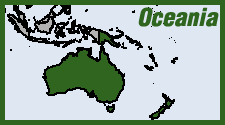 The governor of the US territory of Guam signed into a law a cannabis legalization measure that would establish an adult-use industry on the island. But there is still opposition from local conservatives, and the same dilemmas that have held back establishment of a medical marijuana program in the territory may prove obstacles to implementation.
The governor of the US territory of Guam signed into a law a cannabis legalization measure that would establish an adult-use industry on the island. But there is still opposition from local conservatives, and the same dilemmas that have held back establishment of a medical marijuana program in the territory may prove obstacles to implementation.
Guam legalized adult use of cannabis on April 4 when Gov. Lou Leon Guerrero signed into law a bill that had been passed by the island's legislature a week earlier. But even its modest terms—allowing those 21 or older to possess up to an ounce—were contentious. The bill narrowly passed the Legislature by a vote of 8-to-7.
Guam is a territory rather than a state, but the vote does make the island the second US jurisdiction after Vermont to legalize cannabis by an act of the legislature rather than popular referendum.
"We must regulate this illicit drug that is the most widely used drug in our society," Gov. Leon Guerrero said, according to Pacific Daily News. "We have to take it and control it, monitor its use and effects, benefit from its medicinal efforts, allow our people to live in a safer environment."
Under the Guam Cannabis Industry Act of 2019, otherwise known as Public Law 35-5, adults can grow up to six plants for their personal use—but will not be able to legally buy or sell until regulations are finalized by an appointed Cannabis Control Board. The regs are to drafted within a year, and then must be approved by the Legislature. A 15% tax on cannabis sales will go toward law enforcement and drug treatment programs. Possession of more than an ounce will remain subject to a fine.
Caution and backlash
Leon Guerrero emphasized that she took the decision to sign the law after extensive community consultation, including with the seriously ill in the island's medical marijuana program. Her cautious statements seemed crafted to calm the fears of conservative opponents. "Keeping it illegal in my mind rejects the notion that it exists and that the underground market will continue to prey on us," she said. "We have to be ahead of this and we have to control it."
She also stressed that public use will remain illegal. "Nothing changes in the protection of our children," the governor said, adding that "we must continue to enforce zero tolerance of substance abuse in the workplace."
Sen. Clynt Ridgell, who sponsored the bill, said in a statement: "This has been and continues to be a community issue, but the fight is not over yet. I invite the public to remain focused on continuing to provide input in the development of the rules and regulations by the Cannabis Control Board for safe, adult use cannabis."
The senator was also quick to stress the law's limited nature. "The law makes it clear that public consumption is not allowed," Ridgell told the Guam Daily Post. The law also makes iclear that "you have to purchase it from a licensed cannabis facility."
The Guam Police Department responded to the law's passage with a statement reminding Guamanians that DUI laws will still apply to cannabis. But the spokesman's words seemed to acknowledge the ambiguities around the question of cannabis road impairment. Sgt. Paul Tapao admitted to Pacific News Center that "current testing methods for cannabis in one's body still doesn’t [sic] prove real-time impairment." Therefore "other indicators" will be used as evidence.
Guam's Catholic hierarchy was strictly opposed to the measure. Tony Diaz, director of communications for the Archdiocese of Agana, told Pacific Daily News the church is "very disappointed" with the legalization of cannabis, and will continue to "educate the public about its harm."
Ron McNinch, a political science professor at the University of Guam, told Pacific Daily News he believes the new law will be challenged in court. He cited the Guam Organic Act, passed by the US Congress in 1950, which established the island's territorial government. "The Organic Act says we cannot pass laws that are contrary to federal law and this particular proposal is directly contrary to federal law," he said, adding that "the rule of law means no one is above the law."
One obvious obstacle to establishment of a legal market is the lack of a testing laboratory for cannabis on the island. This question has effectively stalled implementation of the medical marijuana program that was approved by the island's voters in 2016. Guam late last year approved home cultivation for medical users due to lack of progress on the lab question.
Cross-post to Cannabis Now







Recent comments
3 weeks 6 days ago
4 weeks 4 hours ago
7 weeks 22 hours ago
8 weeks 4 hours ago
12 weeks 11 hours ago
15 weeks 5 days ago
19 weeks 6 days ago
20 weeks 4 days ago
30 weeks 4 days ago
34 weeks 4 days ago